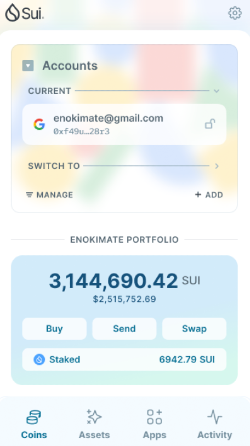A Comprehensive Guide to Getting Started with Sui (SUI)
Joerg Hiller
Aug 17, 2024 08:50
Learn how to set up a wallet, use on-ramps, and bridge assets to get started with the Sui (SUI) ecosystem.
Setting up a wallet and accessing SUI are often the first steps in getting started in the Sui ecosystem, according to The Sui Blog.
Sui offers a vibrant ecosystem of apps and digital assets, and understanding how to access and manage these assets is crucial for maximizing the network’s potential. Whether you’re new to Web3 or a seasoned veteran, familiarizing yourself with wallets and on-ramps is essential for navigating Sui.
SUI can be used for various purposes, including paying for goods and services, purchasing unique digital assets, or engaging in DeFi activities. The first step is setting up a wallet and accessing SUI to explore the ecosystem. Wallets, on-ramps, and bridges are key tools to begin your journey into the Sui ecosystem.
Sui Wallets
To interact with most Sui apps, a wallet is necessary. Wallets function like accounts on the network, allowing users to connect to apps and manage digital assets, such as SUI, NFTs, stablecoins, and other fungible tokens. Wallets are available as browser extensions or mobile apps, each offering different experiences and catering to various user needs.
A typical wallet setup involves creating a new Sui account, which can be done in two ways: creating a new passphrase account or using a Web2 login like a Gmail account via zkLogin. Users opting for a passphrase must secure their recovery phrase provided during setup. Losing access to this recovery phrase means losing access to the wallet. For those using a Web2 login, following the prompts to sign in and ensuring restricted access to the account is crucial.
Here are some of the top wallets in the Sui ecosystem:

Sui On-Ramps
With a wallet set up, users can convert traditional fiat currency into SUI using an on-ramp. On-ramps provide a simple and secure method to purchase SUI and other assets with fiat currencies like USD or EUR.
The most common type of on-ramps are centralized exchanges, such as Coinbase or Binance. Another popular type involves payment processors, which are often embedded directly into wallets and allow users to pay with credit or debit cards.
Here is a list of payment processors that support SUI. Note that availability depends on the country of residence.
Sui Bridges
Web3 veterans with assets on other networks can easily bridge into the Sui ecosystem. A bridge allows users to transfer digital assets between blockchains, enabling the movement of existing tokens into Sui. Bridging typically requires connecting both a source wallet and a receiving wallet to the same app and submitting a transaction from the source wallet. Depending on the networks involved, bridging transactions can take up to 15 minutes to complete.
Currently, the Wormhole Portal Bridge is the primary option available on Sui Mainnet for transferring assets to Sui. Many DeFi apps within Sui also embed the Wormhole bridge, providing a convenient location to bridge assets when exploring DeFi.
Looking ahead, the native Sui Bridge (currently on Testnet) is expected to launch on Mainnet in September, offering another bridging option for the Sui ecosystem.
Begin the Journey
With wallets, on-ramps, and bridges at your disposal, you are now equipped with the knowledge needed to access SUI and explore the ecosystem. These tools form the foundation of your journey into Sui. As the ecosystem continues to grow and more features are developed for these tools, the onboarding experience will become even smoother. Sui strives to offer user experiences on par with traditional web apps, welcoming all users to the Sui ecosystem.
Note: This content is for general educational and informational purposes only and should not be construed or relied upon as an endorsement or recommendation to buy, sell, or hold any asset, investment or financial product and does not constitute financial, legal, or tax advice.
Image source: Shutterstock




